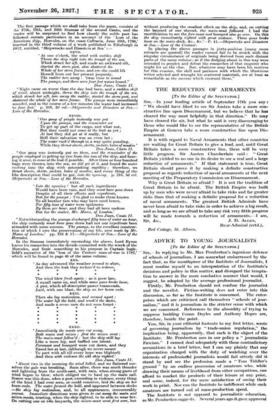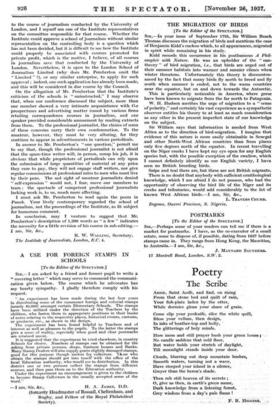ADVICE TO YOUNG JOURNALISTS [To the Editor of the SPECTATOR.]
Snt,—In replying to Mr. Max Pemberton's ingenious defence of schools of journalism, I am somewhat embarrassed by the fact that, as the mouthpiece of the Institute of Journalists, I must confine myself to an interpretation of the Institute's decisions and policy in this matter, and disregard the tempta- tion to answer in the more combative manner that would, I suggest, be adopted by the average professional journalist.
Firstly,. Mr. Pemberton should not confuse the journalist and the novelist. Fiction-writing does not enter into this discussion, so far as the Institute is concerned. The enter- prises which are criticized call themselves " schools of jour- nalism," and it is journalism in the stricter sense with which we are concerned. References to the absurdity of trying to suppress budding Conan Doyles and Anthony Hopes are, therefore, beside the point.
You, Sir, in your editorial footnote to my first letter, wrote of governing journalism by " trade-union regulation," the implication being, apparently, that such is the object of the Institute. Mr. Pemberton sees in our policy a " journalistic Fascism." I cannot deal adequately with these contradictory accusations in a brief letter, but I can say plainly that any organization charged with the duty of watching over the interests of professiorad journalists would fail utterly did it stand by and see the profession made a " Tom Tiddler's ground " by an endless procession of amateurs who, while drawing their means of livelihood from other occupations, can afford to market the products of their leisure at any price, and some, indeed, for the mere satisfaction of seeing their work in print. Nor can the Institute be indifferent while such amateurs are turned out at mass-production speed.
The Institute is not opposed to journalistic education, as Mr. Pemberton suggests. Several years ago it gave approval to the course of journalism conducted by the University of London, and I myself am one of the Institute representatives on the committee responsible for that course. Whether the Institute could approve a school of journalism without similar representation on the controlling body is a question which has not been decided, but it is difficult to see how the Institute could properly be associated with courses promoted for private profit, which is the motive, I believe, of all courses in journalism save that conducted by the University of London. Nevertheless, it is open to the London School of Journalism Limited (why does Mr. Pemberton omit the " Limited " ?), or any similar enterprise, to apply for such appioval ; indeed, one such application has already been made, and this will be considered in due course by the Council.
On the allegation of Mr. Pemberton that the Institute's criticism of the schools is " uninstructed," I may observe that, when our conference discussed the subject, more than one member showed a very intimate acquaintance with prospectuses and advertising matter issued by various firms retailing correspondence courses in journalism, and one speaker provided considerable amusement by reading extracts from them. To the professional journalist, the claims of some of these concerns carry their own condemnation. To the amateur, however, they must be very alluring, for they continue to appear in advertisements in various periodicals.
In answer to Mr. Pemberton's " one question," permit me to say that, though the professional journalist is not afraid that the spare-time writer will, in person, usurp his job, it is obvious that while proprietors of periodicals can rely upon the submission of large quantities of material at any price they care to pay, they will not engage staff writers, nor give regular commissions at professional rates to men who must live by their pens. The sad sight of amateur journalists denied " self-expression " would not, I fear, move our members to tears ; the spectacle of competent professional journalists lacking work is, to us, much more affecting.
I must ask Mr. Pemberton to read again the poem in Punch. Your lively contemporary regarded the school of journalism, not the proceedings of the Institute, as fit subject for humorous comment.
In conclusion, may I venture to suggest that Mr. Pemberton's description of 1,200 words as " a few " indicates the necessity for a little revision of his course in sub-editing.— I am, Sir, &c.,























































 Previous page
Previous page